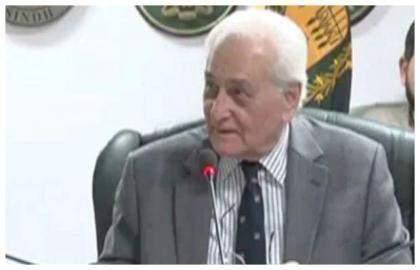The Caretaker Chief Minister of Khyber Pakhtunkhwa, Azam Khan, has taken notice of the suspension of free treatment facilities under the Sehat Card Plus scheme. The Chief Minister has directed the relevant authorities to prioritize the restoration of these free-of-cost treatment facilities and ensure the immediate payment of dues to, State Life Insurance Company which had been a major implementing partner in impressive healthcare initiative. According to the reports, after instruction from the Provincial head, the State Life Insurance has operationalized its province-wise healthcare operation in designated hospitals by resuming free treatment facilities to the people of Erstwhile FATA and Khyber Pakhtunkhwa under the Sehat Card Scheme.
The Sehat Card Plus Scheme was the magnificent pro-poor initiative of the PTI government that was initially launched in Khyber Pakhtunkhwa in late 2020. It was a government-sponsored micro health insurance program under the Prime Minister’s Sehat Insaaf initiative that was later expanded to other provinces then ruled by the PTI and its coalition partners except Sindh which was governed by PPP at that time. The PTI government funded several hundred billion rupees while enabling poor patients to get free-of-cost treatment for major diseases including heart surgery, blood dialysis, radiotherapies, and other serious ailments including cancer. Each adult citizen or household was authorized to expand one million rupees on indoor treatment from designated hospitals in a fiscal year. Historically, a total of 1100 state-of-the-art hospitals have been providing free treatment services across the country except Sindh, while 9.78 million families were registered under the program. Millions of people benefitted from that magnificent project for almost two years until the State Life Insurance Company stopped its operation due to the nonpayment of dues by the treasury in April this year.
Realistically, the people of Pakistan were helpless over the past years, as the headline inflation touched 42% while pushing the nation into extreme poverty and unemployment. The unrestricted price hikes seriously affect all aspects of public life from agriculture to industry and education to healthcare which has become out of reach for poor masses. Meanwhile, thousands of poor patients embattled with chronic diseases have been mourning the incumbent rulers for their inhumanity and cruelty. Recently, the caretaker Chief Minister took notice of the plight of poor patients and ordered the authorities to pay the pending amount to State Life to resume free-of-cost indoor treatment in the province.
About a century ago, the creators of Pakistan had perceived the idea of an independent, Muslim democratic welfare state comprising Muslim-majority regions in South Asia. But, that same idea was hijacked by feudal, military generals and corrupt politicians immediately after the independence from British imperialism. Unfortunately, Pakistani rulers traded the legacies of Quaid-e-Azam Muhammad Ali Jinnah and Dr. Allama Muhammad Iqbal over the past seven decades only to mislead the nation, fulfil their nefarious political agendas, and prolong their rule in the country. Therefore, Pakistan could not achieve the core national goals of political stability, sustainable growth, and socio-economic uplift, while the nation further plunged into unceasing political, social, and economic depletion over the past decades.
Although, the country is passing through a crucial period of history, yet the public has no role in making up for those catastrophic situations that ruined our homeland. The nation has paid a heavy price for the poor governance, mismanagement and corruption of its leaders who always demanded sacrifice from the public but filled their bank accounts and increased their assets in the country and abroad. It has gone beyond all limits and the public is not ready to live within such conditions until and unless Pakistani leaders review their course and bring pivotal changes in their policies. So, the nation comes out of persistent economic degeneration and resumes its journey toward socio-economic opulence and prosperity.







